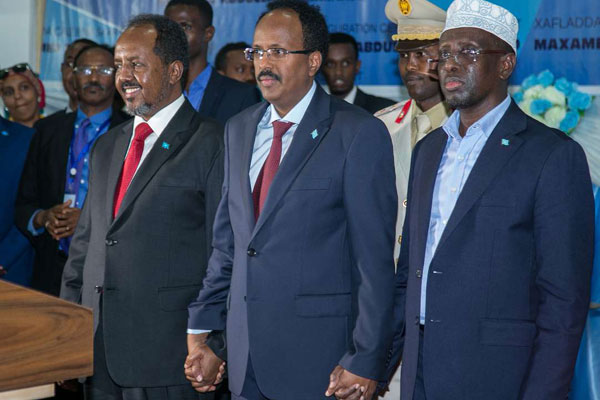By Faisal A. Roble
On the eve of June 26, 2019, Somalia is one-year shy of 60 years-old. No longer is it a young nation, but a mature state albeit in a disarray. Instead of penning a celebratory piece, I rather mourn the loss of what was once an envy of the continent.

It worries me more in that President Farmajo has not proven to us to be the right person to lead this Humpty Dumpty state of Somalia. So, I decided to look at the viability of Farmajo to be or not to be the agent to bring Somalia together.
Politics of Incompetency
About two years ago, when the former President of Somalia, Hassan Sheikh Mahmoud left office, he did so with class. At the transition ceremony, there were three presidents, the incoming and the one that preceded him, and all stood at one single podium to showcase Somalia’s successful yet fragile work of democracy in progress.

There was a national consensus and hope that Hassan Sheikh Mohmoud completed the federation process and paved the path for the new administration to succeed.
Despite minor manipulations of the election process, Hassan Sheik Mohamoud never attempted to usurp power. That is not the case with Farmajo.
At Farmajo’s inauguration, the nation’s euphoria, and jubilation was summed up by a destitute Somali man from Jowhar who managed like millions of Somalis to suspend his class-based oppression and ecstatically chanted: “take me to Farmajo,” or “Farmajo iigeeya.” Alas, that kind of hope is waning due to the inability of Farmajo to articulate a concise clear vision for a coherent and united Somalia.
Many observers suspect that Farmajo may not have the ability nor the intellectual capacity to discharge his responsibilities judiciously. When he was a Prime Minister in 2010, he was more interested in sectarian politics than in building Somalia’s devastated institutional infrastructures.
Many doubted he will not build on what has been passed onto to him. And, their fear has been proven right. Only two years into his four-year term, Somalia is on the doldrums and has gone back to its Humpty Dumpty, disorganized, and disheveled state.
President Farmajo is often attracted to quick euphoric highs as opposed to long-term strategic results. He does give priority to winning short term often superficial goals than delivering on sustainable broader strategies.
Instead, he peddles pedestrian ideas at the expense of what he can do realistically. In a recent national speech to a graduating University class, he promised to establish a “strong central government.”
However, the reality on the ground is he does not even control all of Mogadishu.
He often evades what he can and ought to do. At a recent conference in Mogadishu, for example, a prominent Somali professional criticized Farmajo for his sustained resistance to the establishment of a National Corruption Commission. He does so when his entire team is swimming in a cesspool of corruption, malfeasance, and maladministration.
His politics thrives on creating wedges between federal entities and the center. A case in point is the wedge unnecessarily created between Villa Somalia and the federal member states which is at an all-time high. There is no working relationship to speak of between Villa Somalia and three of the most important states.
Who will Renovate the Humpty Dumpty?
My late friend and one of Somalia’s most celebrated historian, Said Samatar, was fond of applying the Humpty Dumpty allegory to Somali politics. As a profound reader of Roman history and an insightful student of the English literature, Said discovered early on that Somali politics is prone to falls as was the proverbial animalized egg in the Humpty Dumpty fable.
Once that egg falls apart, it is difficult to put it together. Said Samatar has many a time argued that Somali society is like that Humpty Dumpty egg and it always proves difficult to put it together once it falls off the cliff.
No sooner did the Italian governor who oversaw reconciling Somali clans in the runner up to the 1960 Independence Day start than he discovers the similar reality.
Once again, in the 1990s, Admiral Jonathan Howe, a retired four-star United States Navy admiral, who was the general commander of the failed United Nations Operation in Somalia (UNOSOM I) found out to his dismay that the Humpty Dumpty nature of Somali politics to be pervasive.
In the two years that Farmajo has been in office, the Humpty Dumpty that Hassan Sheikh Mohamoud attempted to pull together is now in tatters. Farmajo is inadvertently undoing the gains of the past year right in front of our eyes.
Of the six federal member states that are supposed to make up the Somali Federal Republic, three states (Puntland, Jubbaland, and Galmudug) have officially suspended their working relationship with Famajo’s government. Galmudug is officially divided by design into two parts – between Mullah Shakir and the lawful president, Mahamed Haaf.
Somaliland never acquiesced to be part of the federal project as it claims to have unilaterally declared its independence from Somalia, despite a blanket rejection for official recognition by the world community. The bilateral talks that Hassan Sheik started albeit imperfect is dead in the hands of Farmajo.
As if that was not enough, Hirshabelle and Southwest states no longer enjoy the powers of federal member states; rather they are a mere extension of Villa Somalia.
What is to be Done?
One thing we don’t need is another conference and/or another mediation between the parties by an outside entity such as neighboring or donor countries. To wit, we know enough about the root problem of this latest disintegration – Villa Somalia is evolving into a new non-federal autocratic administration, and to stop that does not need any more mediation by outside forces.
I cannot resist but share an enriching experience I had some years ago. I was part of a mayoral cabinet for the city of Los Angeles to address economic development and the revitalization of 11 depressed neighborhoods. We were tasked to reverse a persistent and ridged underdevelopment and divestment in these areas. I was the lead for three of the 11 districts.
As we embarked on my first regular business and started to talk to the leadership of my respective neighborhoods, I suggested conducting a needs assessment and a focused blight study. Before I finished my prepared statement, a wise old African American lady stood up. Leaning against her doctor-provided cane and her eyes fixated on me, she instructively said” “young man, this community has been over-studied since the Christopher Commission; we don’t need no study, but the only action,” she said.
With that strong statement, the entire house agreed with her.
I was left with no other option but forfeit any new repetitive restudy of the problem and redirected the entire $4.3 million for implementation.
There is a comparable lesson for the Farmajo administration to glean from the wisdom of this African American woman whom I met in South Los Angeles. Somalia needs no US or British ambassadors nor any neighboring countries to bring back our Humpty-dumpty state. We know the problem of present-day disintegration emanates from the autocratic tendencies that preside in Villa Somalia.
Stopping these tendencies is a priority for the nation. And as such, former president Hassan Sheikh Mohmed and other eminent leaders need to speak up and help the ship from drifting. Delay is death and now is the right time to confront the issue.
President Farmajo is fixated on making sure that all regional presidents are his tutelages as are those in Hirshabelle and Southwest. They are using millions of aid money to overthrow Haaf of Galmudug. This is not a benign pursuit. It is the core of his strategy for a second term and possibly establishes an autocratic rule.
If what Farmajo wants becomes a reality, the fragile federal democratic system we have been working during the post-civil war may remain a mirage; in its place, we may entertain the rebirth of a new autocratic system. And that is tantamount to dashing the hope that Somalia tried to revive – Farmajo will go into the history books as the second ruler under whose reign the Humpty Dumpty fall apart.
One last note: friends of Somalia can do a small favor for the people of this great but suffering nation– don’t let Villa Somalia use the aid that you give for overthrowing leaders of federal member states. That is a small favor Somalis will remember.
Faisal A. Roble
Email: [email protected]
———–
Faisal Roble, a writer, political analyst and a former Editor-in-Chief of WardheerNews, is mainly interested in the Horn of Africa region. He is currently the Principal Planner for the City of Los Angeles in charge of Master Planning, Economic Development and Project Implementation Division
We welcome the submission of all articles for possible publication on WardheerNews.com. WardheerNews will only consider articles sent exclusively. Please email your article today . Opinions expressed in this article are those of the author and do not necessarily reflect the views of WardheerNews.
WardheerNew’s tolerance platform is engaging with diversity of opinion, political ideology and self-expression. Tolerance is a necessary ingredient for creativity and civility.Tolerance fuels tenacity and audacity.
WardheerNews waxay tixgelin gaara siinaysaa maqaaladaha sida gaarka ah loogu soo diro ee aan lagu daabicin goobo kale. Maqaalkani wuxuu ka turjumayaa aragtida Qoraaga loomana fasiran karo tan WardheerNews.
Copyright © 2024 WardheerNews, All rights reserved


